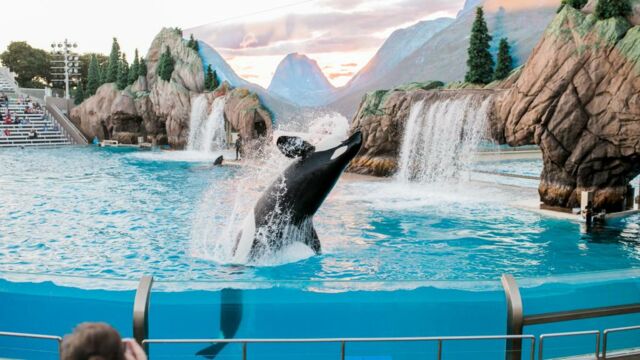The most heartbreaking captivity video has emerged after animal rights activist Phil Demers exposed the immense amount of distress a killer wale displayed at Canada's MarineLand.
Discover our latest podcast
The world's loneliest killer wale
The orca known as Kiska—but also now being referred to as 'the world's loneliest killer whale'—was recorded by Demers bashing its head against a tank. The killer whale is the last one to have survived and has been swimming alone in her enclosure since 2011. She has even outlived all five of her offspring. Demers, who once worked at the aquatic amusement park, has made it his mission to raise awareness of what captive sea mammals are subjected to in these environments.
In a post on Twitter in which Demers posted the disturbing video, Kiska can be seen repeatedly and forcefully banging its own head against a glass wall, which Demers says is a clear sigh of psychological distress. He said:
This video was taken on Sept 4th, 2021. Anti-captivity activists entered MarineLand and observed Kiska, their last surviving orca bashing her head against the wall. Please watch and share. This cruelty must end. #FreeKiska.
And added:
I want to see Kiska taken to an interim facility with other orcas until the Whale Sanctuary Project (in Nova Scotia) is built. Visitors can support find the Whale Sanctuary as well as support animal abuse whistleblowers at The Whale Sanctuary Project.
This video was taken on Sept 4th, 2021. Anti-captivity activists entered MarineLand and observed Kiska, their last surviving orca bashing her head against the wall. Please watch and share. This cruelty must end. #FreeKiskapic.twitter.com/sBCaKleH19
— Phil Demers (@walruswhisperer) September 8, 2021
In captivity for 42 years
The 44-year-old orca has been living in captivity since first having been captured in 1979 off the coast of Iceland. According to Rob Lott, the end captivity campaigner for the Whale and Dolphin Conservation, this self-harming behaviour is common in all whales and dolphins who experience long term captivity:
Sadly, this isn't unique and the repetitive, self-inflicted behaviour shown by Kiska has been seen in other captive orcas where years of boredom in barren, featureless tanks with little or no stimulation manifests itself this way.
Before adding:
Chronic stress can compromise captive orcas' immune systems and physiology causing illness and sometimes death. Kiska has been without an orca companion since 2011 and is deprived of every aspect of the social culture she would have experienced in the wild.















